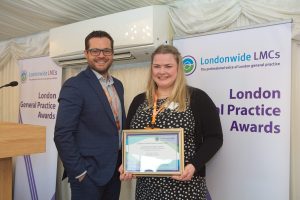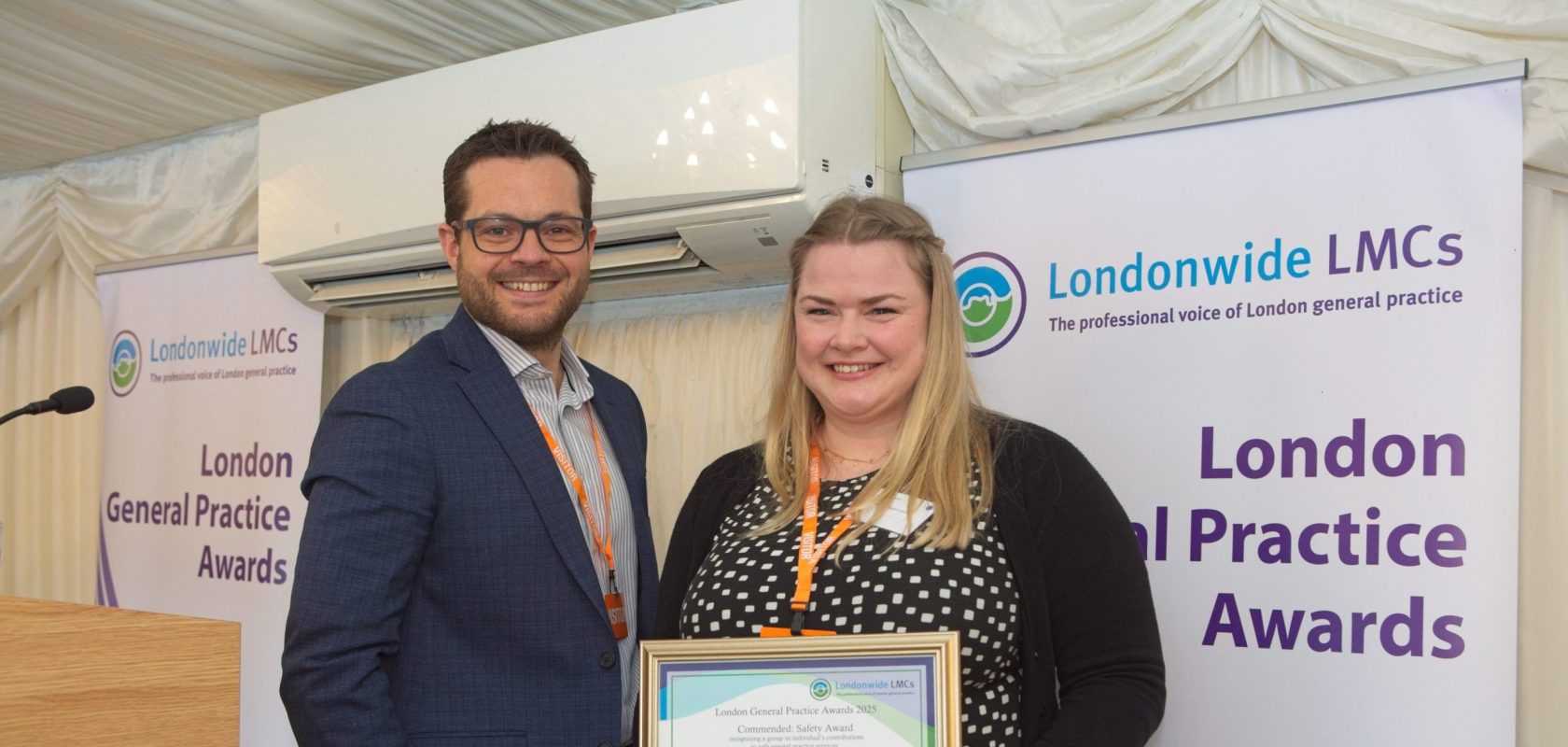This piece was published in September 2025 to mark World Patient Safety Day.
Nominate someone for this year’s awards by 31 October

Dr Nick Woodier, Senior Safety Investigator, Health Services Safety Investigations Body presents Dr Joanna Lovett with her award in February 2025.
The London General Practice Awards
On 6 February 2025, Joanna was commended with the Practice Safety Award for her work as the main lead for LGBTQ+ health at Cavendish Health Centre. “I’m still in shock about the award; it was very unexpected. I’m thrilled and I feel very honoured to have been nominated for it. To be nominated, let alone recognised, is amazing,” she shares.
Joanna believes her nomination stems from the critical need to address trans health, particularly regarding safety issues and understanding their specific health needs. “Trans healthcare in primary care is an area that faces a lot of challenges at the moment. As the award is regarding safety, I think there are lots of issues with safety for this group of patients, predominantly when it comes to things like prescribing, but also actually understanding what their health needs are. A particular area would be their mental health, as they can have higher rates of depression, anxiety, eating disorders, self-harm and suicide. So, trying to raise awareness of what their specific health needs are and how we can support them is really important.”
Joanna is the primary contact for trans patients at her practice, providing extra help and support. “I tend to have more contact with our trans patients, as colleagues generally direct them my way for an additional help and support. However, we are a very close-knit team, even if the patient wants to see someone else, I can still offer advice and support from afar. In general, as a practice, I feel like we do very well at being inclusive and we generally get good feedback regarding that.”
She continues, “I’ve now done lots of training for different groups and the feedback I’ve received has generally been positive. People have found it to be an interesting area, something they didn’t know much about. It’s given them real food for thought about what some of the issues are, so I think it’s also been a bit of a call to action for people to realise what steps they could take in their own practices or job roles to be more inclusive.
“Within the practice, I ensure that all our staff are up to date and trained in that area. We have a list of our trans patients, and I will make sure that the notes are reflective and that patients will be invited to the correct screening programmes” she explains.
LGBTQ+ health initiatives at Cavendish Health Centre and across Northwest London
Since the beginning of 2023, Joanna has been part of the Salaried Portfolio Innovation (SPIN) Fellowship Programme, focusing on trans health in North West London . “The main aim is to improve trans health knowledge within primary care. I do this by training both non-clinical and clinical staff within primary care,” she says. “I try to improve everyone’s knowledge and find ways on how we can best help the trans population within our practices.”
Joanna has been proactive in delivering training through various methods. “Lots of the training sessions are done through the learning hub, but I have also delivered more practice-specific training,” she notes. She continues to run training via the North West London Learning hub. Her efforts have also led to opportunities to present at significant events, including a presentation at the Royal College of General Practitioners’ Health Inequalities sessions, in collaboration with Dr Tara Suchak, service lead of the TransPlus Clinic at 56 Dean Street. “Dr Suchak’s my mentor and a fantastic contact within the gender service.”
She continues, “During my training, I often have an expert patient that comes in and shares their experiences of transitioning, and they’re able to give a different perspective, which I think people generally find invaluable.”
Joanna is also a resource for her colleagues, welcoming queries and challenges they face within their practices. “I’m happy for people to send me queries or questions for any of their patients or challenges that they’re having within their practices. I try to help and support as best as I can. If I don’t know the answer, I’ll be quite transparent, but I’ll always try to see where I can find an answer for them.”
Challenges in health care
Joanna highlights several pressing issues that her practice and many others face. “In the area of trans health within primary care, there are lots of issues such as the hugely long waiting times for specialist services. Therefore, there is a large number of patients waiting to be seen. It can be hard knowing how to support them whilst waiting. Then there is the issue regarding prescriptions including those who are self-medicating, obtaining medications privately or those wishing to start urgently. The RCGP and GMC have guidance on this.” she explains.
She also addresses the complexities between private and primary care. “Some patients decide to seek a private gender specialist review, so we try to make sure that we’re treating them appropriately and that we’re giving the correct advice and it is line with GMC, RCGP and NHS Gender Identity Clinic guidance. You can feel quite helpless, seeing these patients and wanting to do more, whilst acknowledging the current limitations and challenges.”
“Another ongoing challenge is technology and patient records. “Having patients’ records safely in our systems and ensuring that patients are referred to in the correct way with preferred pronouns can be challenging with the current primary care records. For patients wanting to change the gender on their record, we would need to create a new record with new NHS number and these risks losing important medical information as well as having consequences with screening programmes. There are still flaws within that system that need to be addressed.”
Despite these challenges, Joanna praises her practice’s inclusivity and accessibility. “Generally, the practice is very good at being inclusive for our patients with great access, with a mixture of telephone and face-to-face options. People can contact us in a variety of ways. We strive for continuity of care when we can, particularly for this patient group, which I think can be important for them to see the same GP each time if possible.”
“We have lots of medical students and trainees at our practice. It feels nice to be able to educate them regarding trans health issues from an early stage in training to raise awareness of the challenges and solutions as they will be treating these patients regardless of the speciality they go into in the future”.
Note: since this interview the Sullivan Review has published new recommendations about the recording of sex, gender and gender identity in NHS records.

